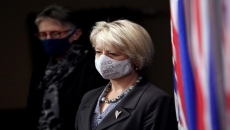An Ontario-wide "shutdown" will be put in place to combat an "alarming" surge in COVID-19 infections, Premier Doug Ford said Thursday as intensive care admissions related to the virus surpassed those of the second wave of the pandemic.
Citing the need for drastic action, Ford said the change will take effect Saturday and continue for at least four weeks.
As a result of an alarming surge in COVID-19 across the province, our government has made the difficult but necessary decision to implement a provincewide emergency brake, effective Saturday, April 3, 2021, at 12:01 AM for at least four weeks.
— Doug Ford (@fordnation) April 1, 2021
Learn more:https://t.co/zJZI8m9dLe pic.twitter.com/BIz6r3uEEs
Premier Ford and Minister @celliottability make an Announcement https://t.co/OAuYspiGcT
— Doug Ford (@fordnation) April 1, 2021
The government is asking Ontarians to limit trips outside the home to necessities such as food, medication and other essential services, but stopped short of imposing a stay-at-home order like it did in January.
Retail stores will see limits on capacity while restaurants will be restricted to takeout, delivery and drive-through service, the premier said.
The government has said schools will also remain open because they are crucial to students' mental health.
"The decision was not made lightly," Ford said in announcing the new measures. "I know the toll these restrictions continue to take on people's mental health and well-being."
The announcement came hours after the province's science advisers said stay-at-home orders are needed to control the third wave driven by more contagious and deadly COVID-19 variants.
The Ontario Science Advisory Table said that otherwise, the province could see up to 6,000 new infection cases by mid-April. With the restrictions in place, the modelling data shows there will still be about 800 people in ICUs by the end of April.
Dr. Adalsteinn Brown, co-chair of the group, said short-term case projections will depend entirely on the public health measures implemented by the government and vaccination rates.
Brown said the province's vaccine rollout is not reaching the highest risk communities, hampering its impact as an effective strategy to fight the pandemic.
He also said that 40 per cent of Ontario residents aged 75-79 and 72 per cent of those aged 70-74 still have not received their first dose of the vaccine.
"We are expanding first dose coverage, but it remains incomplete," Brown said.
The science advisory table also suggested Thursday that limiting inter-provincial movement - similar to what was imposed in January and expired starting in mid-February - would help bring the number of new cases down.
Ontario's decision came as British Columbia moved to enact a three-week "circuit breaker'' on some activities, set to take effect at midnight and continue until April 19.
During that time, indoor dining and activities at fitness centres will be halted and the Whistler Blackcomb ski resort will be closed. The province is also reinstating tougher restrictions on religious services that had been loosened just last week.
Also on Thursday, three Quebec cities, including the provincial capital, moved into a lockdown in an effort to rein in surging infections.
The lockdown in Quebec City, Levis and Gatineau will see schools and non-essential businesses close for at least 10 days, Premier Francois Legault announced Wednesday. There will also be an earlier curfew -- 8 p.m. instead of 9:30 p.m. -- to further discourage social gatherings.
Another four regions where cases counts are on the rise are switching Thursday to a more restrictive level of Quebec's colour-coded pandemic system.
Legault has said the increase in infections in the affected regions isn't due to inadequate health measures but rather to people violating those rules.
In Ontario, the official Opposition slammed the Ford government for ignoring experts' early warnings about the third wave.
NDP Leader Andrea Horwath said the new restrictions fall short of what’s needed, pointing to the lack of paid sick leave, workplace protections and smaller class sizes in schools.
“It’s a too little, too late response by this government to what we knew was coming,” she said. “I’m worried that this failed approach is going to fail us again.”
Experts have been saying for months that COVID-19 infections are happening mostly in workplaces, while warehouses and distribution centers in some hot spots have reported massive outbreaks.
Ashleigh Tuite, an epidemiologist at the University of Toronto, said she supports measures such as paid sick leave and giving essential workers paid time off to get vaccinated.
Both are “hugely important” to controlling the pandemic and could help avoid continued reliance on strict measures to control cases, she said.
“The way that we actually have an appreciable impact on the pandemic is by providing these additional supports,” she said.
Earlier Thursday, more than 150 intensive care unit doctors signed an open letter to Ford, calling for stricter measures.
"The current measures and framework are not working to contain the spread of this virus," reads the letter. "Even if we had unlimited ICU capacity, allowing these (variants of concern) to spread exponentially is unethical."
The CEO of the Registered Nurses' Association of Ontario called the new measures "disappointing".
"They're taking a calculated risk with the lives of people," Doris Grinspun said. "These are people in the ICU that are in their 40s or 50s ... and some will not make it."
The chair of the Council of Ontario Medical Officers of Health said that while the changes announced Thursday were needed, the province could do more.
"We strongly believe that a stay-at-home order is also required to successfully prevent further cases and strain on Ontario's acute care system as we continue to vaccinate more Ontarians," Dr. Paul Roumeliotis said in a statement.
Nearly one in six Canadians have now received at least one dose of a COVID-19 vaccine, with 5.1 million people vaccinated as of Thursday morning, according to Health Canada, which noted about 690,000 of those have received both doses.
Close to three out of four Canadians over the age of 80 have obtained at least one dose, and one in three people between 70 and 79, it said.
Quebec is leading the country in terms of vaccinations, with 17.5 per cent of adults having at least one dose, Health Canada said. Saskatchewan is the runner up with 14.9 per cent, followed by Alberta with 14.6 and Ontario with 13.9.
Manitoba is next at 11 per cent, with Nova Scotia lagging behind at 5.6 per cent.



.jpg)

